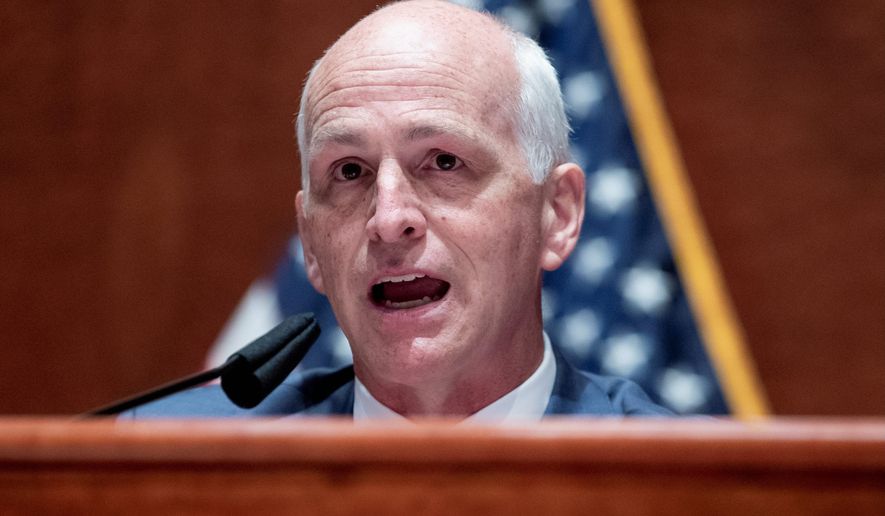The lame-duck Congress could be facing a rare post-holiday return to Capitol Hill if President Trump follows through on a threat to veto a massive $740 billion defense policy bill in the coming days, a top House Democrat said Monday.
House Armed Services Committee Chairman Adam Smith, Washington Democrat, told reporters that lawmakers could be summoned to Washington during their annual end-of-year break to push the National Defense Authorization Act (NDAA) through, a bill that has annually been approved with bipartisan support for nearly 60 years.
Mr. Trump has issued several threats to block the must-pass legislation — which sets military spending levels, gives soldiers a pay raise, and offers policy guidance on a vast range of military and security issues — because lawmakers have refused to add the repeal of a regulation offering a legal shield to social media companies such as Facebook for the content on their sites.
“If the president vetoes it, we will come back to vote override,” Mr. Smith said in a conference call with reporters. “There are really no other possibilities.”
Even Republicans such as Senate Armed Services Committee Chairman James Inhofe of Oklahoma who agree with Mr. Trump that the so-called “Section 230” provision in federal telecommunications law should be scrapped say the fight shouldn’t be fought in the must-pass NDAA.
“Section 230 needs to be addressed, but in a different place, and in a different way,” said Texas Rep. Mac Thornberry, the ranking Republican on the House armed services panel. “Doing it on the defense bill, airdropping it at the last minute, is not the right thing.”
Mr. Trump had earlier issued a second veto threat over NDAA language that would require the Defense Department to rename 10 military bases that honor former leaders of the Confederacy. The proposal has received bipartisan support and is included in the final version of the bill being voted on in Congress this week.
Mr. Trump tweeted his demand that Section 230 repeal be inserted in the bill twice last week, publicly calling out Mr. Inhofe for resisting his call.
Both Mr. Smith and Mr. Thornberry argued that a presidential veto of the defense policy bill could have serious implications for military families.
“The short-term damage is likely that [service members] won’t get paid bonuses,” Mr. Smith warned.
“Training will stop on a number of very large training areas across the country. Our ability to properly reform the Pentagon stops. So, it’s bad, and we are going to do everything we can to try and avoid it.”
Mr. Thornberry predicted that “military families are going to see their compensation cut, and that is undoubtedly the effect if we don’t pass an authorization bill.”
“Plus, there are a lot of new benefits, good things in this bill, that would not take place,” he added.
The House is expected to vote on the compromise final version of the NDAA on Tuesday, while the Senate is set to vote on the bill later this week. The two chambers passed their earlier versions of the bill with veto-proof majorities.
Mr. Trump has yet to have one of his vetoes overridden by Congress, and failure to do so this time would leave the next Congress that is seated in January with a heavy lift to revive the bill.
Mr. Smith rejected talk of a stripped-down, “skinny” version of the bill to skirt Mr. Trump, saying, “We would never pass the skinny bill. That’s not an option.”
A presidential veto of the NDAA would require a two-thirds majority in both the House and Senate to override, a total Mr. Smith said is possible even with Republicans holding a slim majority in the Senate.
“If it takes two-thirds to pass it because the president is being unreasonable, then we will get that.”
Mr. Thornberry predicted that the legislation could see even more backing from Republicans than when it was initially approved earlier this year.
The House members said they have secured enough votes to override a likely veto, but both expressed confidence in its ability to easily pass with bipartisan support.
“I’m feeling pretty good,” Mr. Thornberry said about the bill’s passage. He said that he has heard of increased support from his GOP colleagues because of language that has been modified during negotiations.
“We have an excellent bill, a bipartisan bill that has a lot of very important, very good provisions in it,” Mr. Smith said. “There is not a single member of this Congress who can’t vote for this bill in good conscience and feel good about it, in my humble opinion, so we should pass it.”
• Lauren Toms can be reached at lmeier@washingtontimes.com.




Please read our comment policy before commenting.